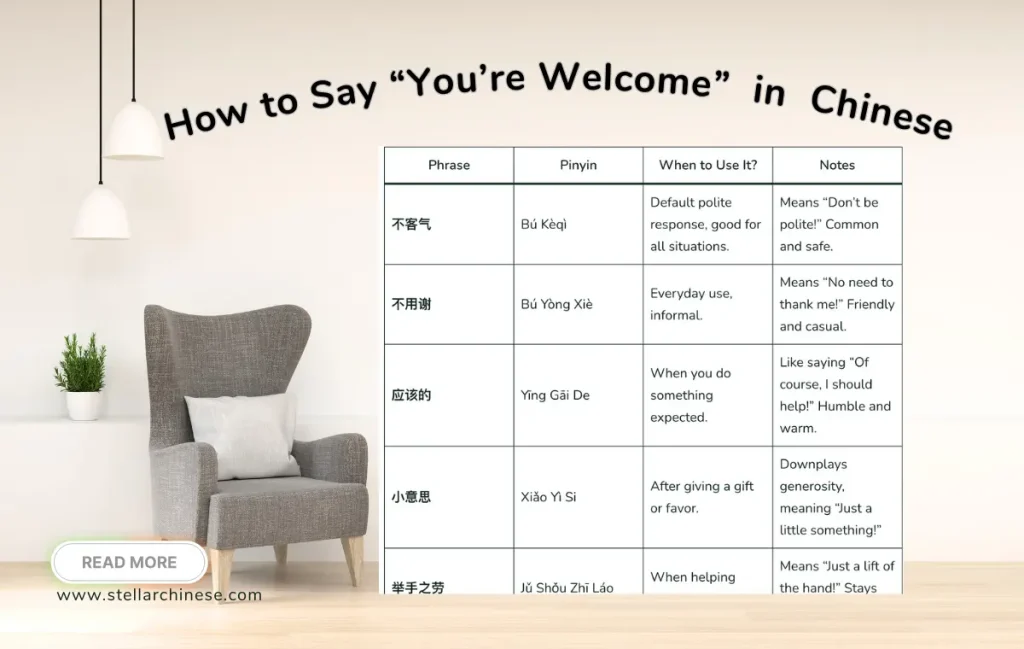Your American friend, who’s been diving into Chinese culture lately, shows off their modest collection: a well-loved book on Chinese history, a simple tea set, and the China Jumbo Country Map Magnet you gifted them last week.
They press it onto their fridge, tapping Chengdu on the map — the city they’ve been reading about — and murmur, “This is so COOL. Xièxie.”
You smile, then hesitate. “Wait… how do I say ‘you’re welcome’ in Chinese again?” 🤔
For a split second, silence hangs — until you recall 不客气 (bú kèqì).
But now you wonder: Is there a warmer way to reply? What if they travel to Guangzhou and hear locals say something different?
Let’s unpack 17 real-world ways to say “you’re welcome” in Chinese — because “bú kèqì” is just the start. (Spoiler: One phrase involves literally shrugging off gratitude. 😏)
How to Say “You’re Welcome” in Chinese
Chinese has multiple ways to say “you’re welcome,” but here’s the fun twist — sometimes, people don’t say it at all!
In Western cultures, “You’re welcome” is a reflex response.
But in China, humility and indirect communication are key. Sometimes, a nod, smile, or change of topic is the best way to respond.
Let’s break down the best ways to say “You’re welcome” in Mandarin, dialects, and even internet slang!
Different Ways to Say “You’re Welcome” in Chinese
Here’s your cheat sheet with pronunciations and clear usage scenarios. No fluff, just facts!
Read more:
- Formal vs. Casual Goodbyes in Chinese: Which One Should You Use?
- Romantic Chinese: Expressing Love Beyond Words
- How Are You in Chinese: The Real Phrases You Should Be Using
| Phrase | Pinyin | When to Use It? | Notes |
|---|---|---|---|
| 不客气 | Bú Kèqì | Default polite response, good for all situations. | Means “Don’t be polite!” Common and safe. |
| 不用谢 | Bú Yòng Xiè | Everyday use, informal. | Means “No need to thank me!” Friendly and casual. |
| 应该的 | Yīng Gāi De | When you do something expected. | Like saying “Of course, I should help!” Humble and warm. |
| 小意思 | Xiǎo Yì Si | After giving a gift or favor. | Downplays generosity, meaning “Just a little something!” |
| 举手之劳 | Jǔ Shǒu Zhī Láo | When helping someone casually. | Means “Just a lift of the hand!” Stays humble. |
| 这是我的荣幸 | Zhè Shì Wǒ De Róngxìng | Formal events, job interviews. | “It’s my honor.” Adds sophistication. |
| 为您服务是我的职责 | Wèi Nín Fú Wù Shì Wǒ De Zhí Zé | Professional settings. | Corporate-level politeness, often heard in service industries. |
| 没问题 | Méi Wèntí | Casual and friendly. | Equivalent to “No problem” in English. |
| 没事 / 没事儿 | Méi Shì / Méi Shìr | Close friends, family. / Northern Chinese slang. | Similar to “It’s nothing!” Often used with a wave of the hand. / Similar to “No big deal!” Often paired with a casual shrug or wave of the hand. The ultimate “Eh, don’t mention it!” energy. |
| 客气啥 | Kè Qì Shá | Northern China, casual settings. | Means “Why so polite?” Adds a friendly, sassy tone. |
| 甭谢了 | Béng Xiè Le | Beijing street markets, family chats. | Rough-around-the-edges cool. Add “儿” (ér) for Beijing slang. |
| 别见外 | Bié Jiàn Wài | When reassuring a friend or close acquaintance. | Literally means “Don’t treat me as an outsider!” Shows warmth and closeness. |
Also read:
Regional & Slang Variations
Want to impress locals and score extra dumplings? Use these dialect-specific phrases!
| Phrase (Dialect) | Pinyin | Where You’ll Hear It | Vibe |
|---|---|---|---|
| 免客气 (Hokkien) | Bián Kheh-khì | Taiwan, Fujian, Southeast Asia | Southern charm, often heard in night markets. |
| 唔使客气 (Cantonese) | Mh Sái Haak Hēi | Hong Kong, Guangzhou | Friendly and casual, pairs well with tea. |
| 酒酒水啦 (Cantonese meme) | Sǎ Sǎ Shuǐ La | Cantonese-speaking areas, online | Similar to “Easy peasy!” in English. |
| 基操勿6 (Internet slang) | Jī Cāo Wù Liù | Gaming streams (pro players’ “casual” moves), social media (humblebrag posts) | Gen-Z’s mix of sarcasm and self-assuredness. Basic 操作 (basic skills), 勿扣 666 (don’t spam ‘666’). 666 = Chinese internet slang for “amazing!” (from gaming culture). |
| 不谢啦 | Bù Xiè La | Online, texting with friends | Casual and trendy, often used in social media chats. |
What Not to Say
| Mistake | Why It’s Wrong |
|---|---|
| 欢迎你 (Huānyíng nǐ) | Means “Welcome!” (as in, “Welcome to China!”), NOT “You’re welcome.” |
| Overusing 不客气 (Bú Kèqì) | In small favors, just smiling or nodding is more natural. Saying it too much sounds robotic. |
| Mixing Formal and Casual | Using “为您服务是我的职责 (Wèi Nín Fú Wù Shì Wǒ De Zhí Zé)” in casual settings sounds overly formal, like corporate talk. |
Final Thoughts
Now you’re equipped with the best Mandarin, dialectal, and slang responses to “谢谢 (xièxie)!”
Whether you’re keeping it classic with 不客气 (bú kèqi), adding Beijing swag with 甭谢了 (béng xiè le), or flexing Cantonese meme culture with 酒酒水啦 (sǎ sǎ shuǐ la), you’re ready to sound like a native!
What’s your favorite way to say “you’re welcome” in Chinese? Drop a comment below!
